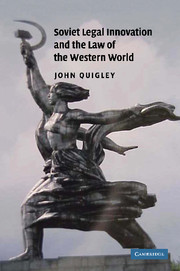Book contents
- Frontmatter
- Contents
- Abbreviations
- Preface
- Acknowledgments
- PART ONE THE SOVIET CHALLENGE
- PART TWO THE WEST ACCOMMODATES
- 8 Panic in the Palace
- 9 Enter the Working Class
- 10 Social Welfare Rights
- 11 The State and the Economy
- 12 Equality Comes to the Family
- 13 Child-Bearing and Rights of Children
- 14 Racial Equality
- 15 Crime and Punishment
- PART THREE THE BOURGEOIS INTERNATIONAL ORDER
- PART FOUR LAW BEYOND THE COLD WAR
- Notes
- Bibliography
- Index
14 - Racial Equality
Published online by Cambridge University Press: 27 July 2009
- Frontmatter
- Contents
- Abbreviations
- Preface
- Acknowledgments
- PART ONE THE SOVIET CHALLENGE
- PART TWO THE WEST ACCOMMODATES
- 8 Panic in the Palace
- 9 Enter the Working Class
- 10 Social Welfare Rights
- 11 The State and the Economy
- 12 Equality Comes to the Family
- 13 Child-Bearing and Rights of Children
- 14 Racial Equality
- 15 Crime and Punishment
- PART THREE THE BOURGEOIS INTERNATIONAL ORDER
- PART FOUR LAW BEYOND THE COLD WAR
- Notes
- Bibliography
- Index
Summary
For the united states, legalized racial segregation caused problems as an issue that could be exploited by its adversaries. During World War II, both Japan and Germany focused on segregation in their wartime propaganda against the United States. In the years following World War II, criticism came from an array of nations, even some that were friendly to the United States. Lynchings of Blacks in the American South, prevalent at that period, drew particular criticism.
In the United States–Soviet battle for hearts and minds around the world, segregation became a focus of the Soviet critique of American capitalism, and a source of embarrassment for the United States. The Soviet media highlighted not only lynchings, but the economic situation of Black tenant farmers, and the poll tax, which kept many African-Americans from voting.
The American South at the United Nations
At the newly created United Nations, the USSR promoted the establishment within the Commission on Human Rights of a subcommission that would focus on race issues. The Subcommission on Prevention of Discrimination and Protection of Minorities began work in 1947. Dean Rusk, who, as a Department of State officer, represented the United States at the United Nations, conveyed to Washington the risk that the Subcommission presented for the United States: “This Subcommission,” he wrote in a confidential memorandum, “was established on the initiative of the USSR, and there is every indication that that country and others will raise questions concerning our domestic problems in this regard.”
- Type
- Chapter
- Information
- Soviet Legal Innovation and the Law of the Western World , pp. 115 - 124Publisher: Cambridge University PressPrint publication year: 2007



